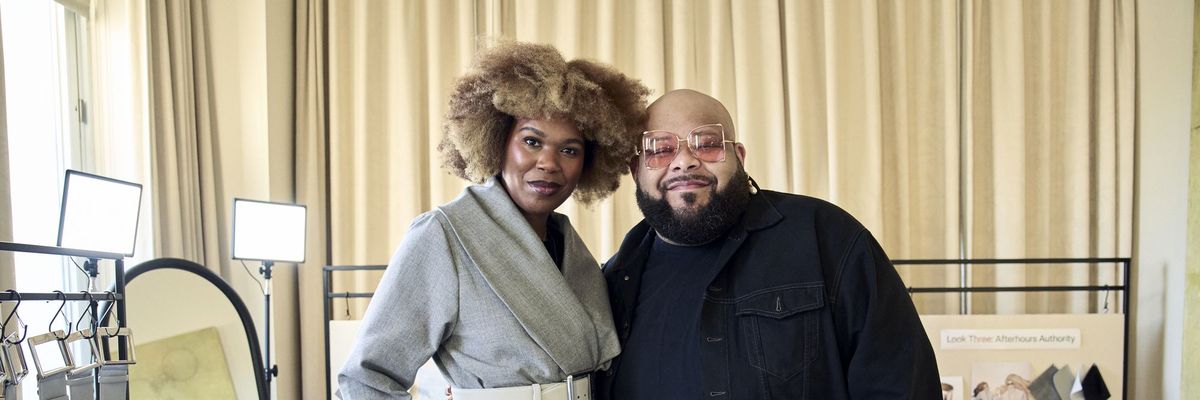
Last summer, Gallup published a study stating that, worldwide, people are more stressed out than they have ever been. The reason why this should be relevant to you is that when it comes to things like heart disease, insomnia, depression, cancer, and even HIV — if stress is not the cause of these ailments, stress 1000 percent makes these issues far worse. Hell, even the common cold is thought to be brought on by stress. Not to mention the fact that stress can also throw your periods off, make it challenging to conceive, impair your moods and even make it hard to make wise decisions. Yeah, stress is a really big deal.
That’s why it truly can’t be said enough that it’s okay to put firm boundaries in place when it comes to any — and I do mean ANY — person, place, thing, or idea that triggers your stress levels. It’s also essential that you implement certain practices that can help to keep your stress levels down to an absolute minimum. One of the best ways to do that is to take optimal care of your mental health. And here are ten ways to do it.
1. Never Rush into or Out of Bed

Getty Images
There’s a verse in the Bible that simply says, “Be angry, and do not sin. Meditate within your heart on your bed, and be still.” (Psalm 4:4 — NKJV) Ever since I happened upon it, it’s been a personal mantra for me. One reason is that it goes to show that there are a myriad of different ways to meditate. Another is because it’s a reminder that you can oftentimes avoid making unwise decisions by lying in your bed and being…still. So, if you’re someone who feels guilty about enjoying some extra time in your own bed, honestly, don’t.
Besides, did you know that there is such a thing as hurry sickness? Although it’s not a science-based medical condition, it is widely discussed among mental health experts. The backstory is, since stress and anxiety are prevalent among so many of us, a term was coined to describe what happens when we are constantly feeling urgency or the need to rush…when there’s no real pressing reason to. And yes, living this way can lead to things like headaches, fatigue, and lowered immunity.
That’s why, for the sake of your mental health, it’s best to create a sleep routine (check out “The Self-Care Bedtime Routine Every Single Woman Needs”) so that you’re not rushing into bed (that can create anxiety and make it difficult to fall asleep) and that you set your alarm to wake you up about 20-30 minutes before you actually need to get out of bed. Believe it or not, spending some of your morning time easing into the day can do wonders when it comes to pacing your energy and not pushing past your bandwidth until it’s time to come home and rest again.
2. Devote At Least a Half-Day to Nothing but Self-Care (WEEKLY)

Getty Images
I am a traditional Sabbath observer. This basically means that I keep the Sabbath in the way that Jewish people do: from Friday sunset to Saturday sunset. Although I was born into this way of life, as an adult, it’s still a part of my self-care routine because, there is nothing that compares to taking an entire day off from the demands of the world to do nothing but rest (or as Shabbat literally means in Hebrew, “to cease from creating”).
During that time, sometimes I sleep in, sometimes I order takeout (I try and do it the day before so that I’m not overworking folks on the day when I don’t), and sometimes I’m doing a skin routine or nurturing my scalp (dead serious; check out “Treat Your Scalp To A Little Bit Of Detoxing This Weekend”). Whatever it is, it’s very self-care-focused — and I love that for myself.
It's unfortunate that a lot of people are hard-wired to think that pampering themselves (check out “5 Reasons You Should Unapologetically Pamper Yourself”) is a luxury when, 1000 percent, it should be treated like a luxury (check out “Want To Love On Yourself? Try These 10 Things At Home.”). Because how can you give your best to others if you’re not nurturing yourself, to begin with?
Listen, the day when you choose to do it is totally up to you; however, do devote at least half a day, each and every week (even if you have to break up the days) to nothing but self-care. It’s an investment that you will never — EVER — regret making.
3. Don’t Talk Yourself Out of Your “Gut No's”
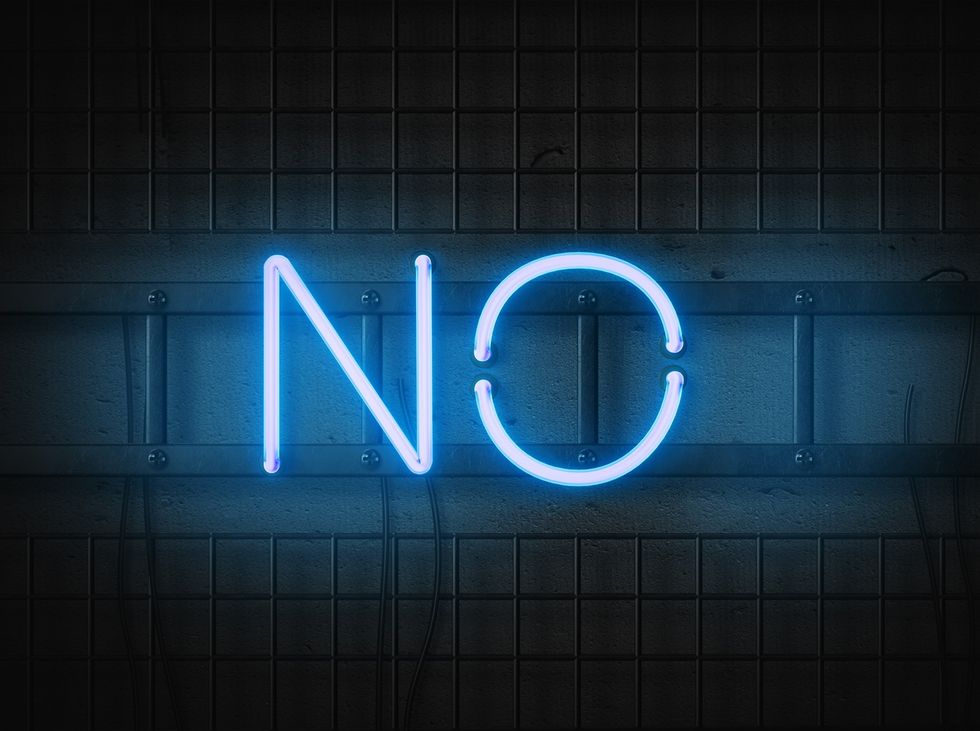
Getty Images
Back in 2019, I wrote one article entitled “So, Experts Have Something To Say About Your Intuition's Accuracy” and another entitled “When You Should Trust Your Gut & When You Shouldn't.” The method behind the madness is our intuition was never designed to do what I see so many TikTokers attempt: to weaponize. In fact, I firmly believe that without some serious self-awareness and humility (not one or the other…both), oftentimes, what people think is intuition or their gut instinct is really nothing more than projecting that’s been fed by their ego.
Keeping all of this in mind, while I definitely think that “my intuition is always right” could use some tempering, I also believe that when you’re asked to do something and your first mind is to say “no,” you shouldn’t try and talk yourself out of that — nor should you let other people do it.
You know, there’s an author by the name of Nick Chellsen who once said, “Boundaries are what you say 'no' to. Priorities are what you say 'yes' to,” and I think that summarizes the point that I’m trying to make here perfectly. Because we live in a culture and society that — let’s be real — can be super self-consumed, oftentimes, when folks want us to do something, our own needs and feelings about the request aren’t taken into account. Basically, so long as “they” are able to get their way, that’s all that matters (to them).
That’s why we have to listen when our mind, body, and/or spirit sets the boundary known as “no” — or at least wait. We need to step back and listen to what our psyche is trying to convey to us before making any kind of commitment.
Unfortunately, many humans seem to really enjoy pushing people out of their boundaries, almost as if it’s an Olympic sport. You can’t do anything about them; however, you can honor your own self by not giving them the room in your life to do so. So, if someone asks you to do something and you don’t feel good about it, instead of allowing them to talk you out of why, spend some time looking for the answer and then move from there. Trust me…they can wait. And if the answer is indeed “no,” chile, they’ll survive.
4. Take a Day Trip Every Couple of Months

Getty Images
With the summer season technically ending (this year) on September 23, it’s interesting that, although around 63 percent of Americans had planned on going on some sort of summer vacation, reportedly, 58 percent won’t be able to because they can’t afford it (inflation is a mutha). What makes matters even worse is a lot of people won’t even try to figure out alternatives even though vacations are proven to help reduce stress, lower anxiety, decrease heart disease and depression risks, provide quality time with people you care about, and ultimately improve your overall quality of life. Yes, y’all, vacations are very necessary.
So, what if you get that yet your bank account doesn’t agree with you? Being that it’s also been proven that a mere change of scenery can do wonders when it comes to your moods and health and well-being, try and at least go on some sort of day trip before the summer season ends and then commit to “rinsing and repeating” every few months. Even going to the next town a couple of hours away to eat at a new restaurant with a couple of friends can feel like a breath of fresh air. Don’t knock it until you’ve tried it.
5. Have “Phone Hours”
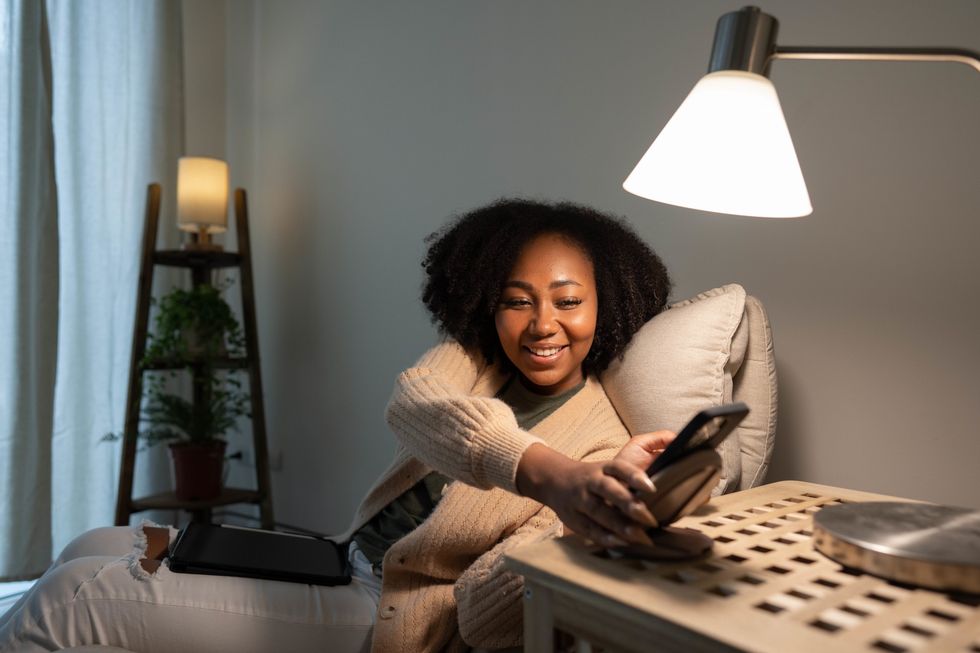
Getty Images
I remember once having a conversation with an elder about why people seem to be more stressed than ever. Their reason, I found to be a very interesting one: “Cell phones are doing it. Back when I was young, you weren’t constantly on the phone, taking in all kinds of conversations and information all of the time. You drove without it. You shopped without it. You would go on a date and focus on nothing but the other person. These damn phones keep people so distracted that they can barely even function.”
She’s not totally off-base here. While some health professionals say that always having your phone on can trigger intense emotions and disrupt your quality of sleep, others say that limiting your social media time to no more than an hour a day and devoting 3-4 of your waking hours to not being on your phone at all will not only help to keep you in a better mood, it can remind you to put more energy into cultivating the relationships that you actually have offline. Not to mention the fact that constantly scrolling is very possibly standing in the way of you becoming more successful at work (no joke).
If you read all of this and you’re still trying to find ways to justify why you should keep your phone on 24/7, there is such a thing as being a phone addict. Currently, only a small number of folks fall into the category, yet the demographic is ever-rising. You can read more about it here.
6. Put Your Frustrations on a Time Limit

Getty Images
Contrary to popular belief, you can control your emotions a lot more than you might believe. Some mental health professionals call it “emotional regulation,” and it’s all about deciding how you are going to respond or react to something. Many people see this as a sign of maturity because, while it makes perfect sense for, say, a toddler to throw tantrums and overreact (because they haven’t been taught self-regulation skills yet), an adult should not be acting the same way that they do.
So, what are some of the things that you can do to keep your frustrations from getting totally out of control? Meditate. Journal. Go for a walk. Deep breathe. Exercise. Speak with someone (you can trust who listens well and gives good insight). Take a nap. Consume healthy foods that are designed to de-stress you (check out “9 Foods That'll Actually Decrease Your Cortisol (Stress) Hormones”). Kiss your partner (it literally lowers cortisol levels). Spend some time alone to regroup.
Another thing you can do that is where the big girls and boys play? Give yourself a certain amount of time to feel the way that you do. If someone pissed you all the way off, give yourself permission to be mad as high hell for a couple of hours — and then decide that it’s time to take that feeling down a notch (or 10). I do this often, and you’d be amazed by how empowering it is to tell your feelings that they can’t “make you” do anything…that you are the one who manages them.
7. Declare Your Affirmations Out Loud
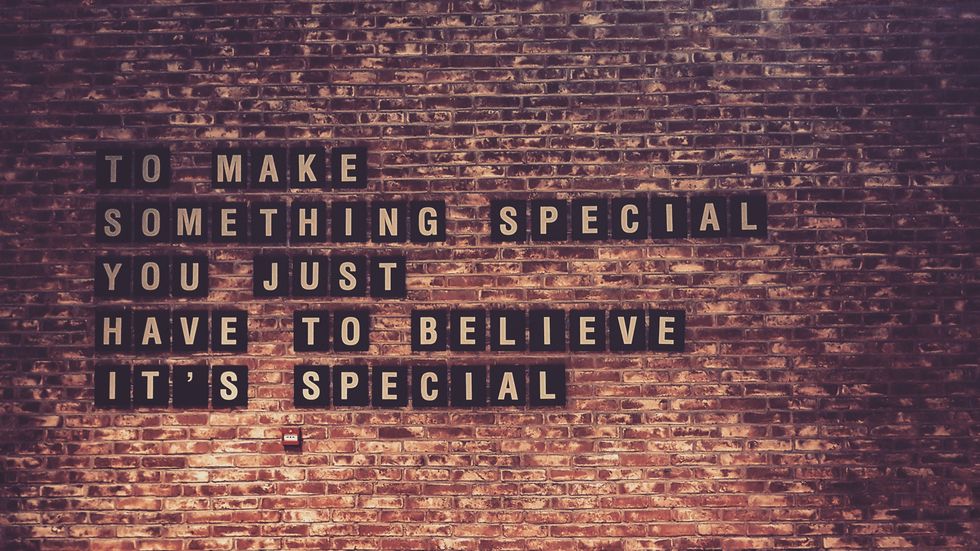
Unsplash
Negativity bias. If you’ve never heard of it before, it’s a psychological term that centers around the fact that most people have a tendency to give more attention to negativity than positivity. This is why, if you ask most people to list five things that they like about themselves and then five things that they don’t, they will typically start off by listing all of the “bad stuff” first (SMDH).
Since cynicism is linked to heart disease, hostility increases stress levels (and depression-related symptoms), tension can cause things like digestive problems and fertility issues, and there are articles out in cyberspace like “Why Negative People Are Literally Killing You (and How to Protect Your Positivity)” — it is absolutely essential that you are hypervigilant and super proactive about “rerouting” negative thoughts by coming up with some affirmations that will cause you to feel good about yourself. There is a lot of data that says the more positive thoughts that you have, the more they are able to influence your actions for the better.
And why should you say them out loud? Research states that it helps with constructive thinking, problem-solving, and building self-confidence. Not to mention the fact that repeating good self-talk improves focus reduces stress, and makes you feel more fearless. So, whether it’s while you’re taking a shower, when you’re on your lunch break, as you’re working out, when you’re making dinner, or before you turn in, jot down some positive things about yourself and life in general, and verbalize them aloud. Your mental health will be oh so glad that you did!
8. Create a “Good Memories” Playlist

Getty Images
The brain can be a tricky thing sometimes. For instance, did you know that, when it comes to listening to sad songs, science says that it can actually help to put you into a better mood — if not immediately, eventually? The logic is that if a sad song creates nostalgia, it can help you to process your emotions, and that can ultimately reduce anxiety and bring forth feelings of clarity.
At the same time, music that swings more to the happy (or newer) side can give you a “dopamine hit” that will put you into a better mood, boost your brain health, and help to make you a much more creative individual. So, even if you’ve got a playlist that’s devoted to ole’ what’s-his-name from your past, be intentional about also putting together a list of songs that will put a smile on your face and cause you to tap your feet underneath your desk, too (just make sure that it’s not super fast music; that can actually distract you and make you less productive during working hours).
9. Speak Your Love Language...to Yourself

Getty Images
It always tickles me whenever I sit in sessions with couples who get upset that their partner sucks at speaking their love language. When I ask them if they speak it to themselves, more times than not, a blank look comes over their face. Listen, if you’re not prioritizing how to fully, properly, and effectively express love to yourself, why are you being so hard on those around you who aren’t the best at doing it either (hmm…)?
Virtually everyone knows at this point that the five primary love languages are words of affirmation, quality time, gifts, acts of service, and physical touch. Okay, but when it comes to what your “top two” are, how are you showing your own self that you love you? Do you speak positively about yourself (words of affirmation)? Do you schedule regular “me” time (quality time)? Do you make it a point to get yourself some flowers or save up to get something that you’ve been eyeing for a while (gifts)? Do you feel okay about hiring someone to do something that you hate (like maybe getting a housekeeper to thoroughly clean your home once every season (acts of service)? When’s the last time that you gave yourself a foot massage while watching one of your favorite shows (physical touch)?
French author Anaïs Nin once said, “My mission, should I choose to accept it, is to find peace with exactly who and what I am. To take pride in my thoughts, my appearance, my talents, my flaws and to stop this incessant worrying that I can’t be loved as I am.” And you know what? It’s so much easier to not just say this but mean it when self-love is a daily practice — when you speak your own love languages to yourself…fluently.
10. Admit When You’re Wrong
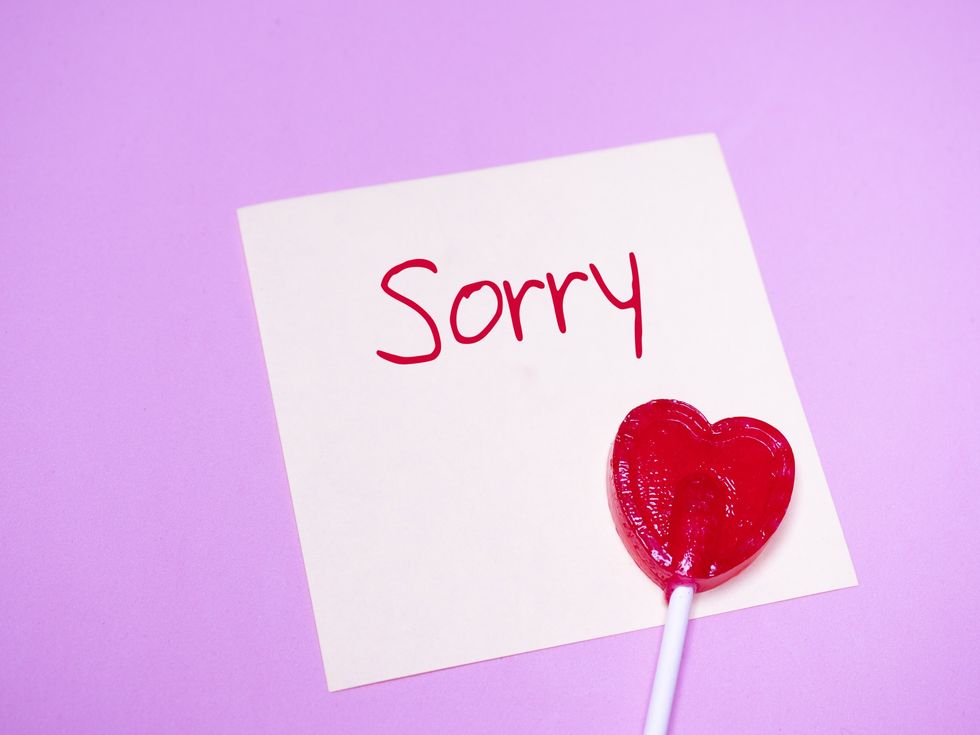
Getty Images
I will forever die on the hill that the reason why a lot of people struggle with admitting when they are wrong and/or apologizing to other people is because their parents absolutely sucked at modeling it to them (le sigh). That said, if you happen to be a parent who is reading this, one of the best things that you can EVER do for your child is teach them how to hold themselves accountable — and children learn best when adults lead by example (check out “What It Actually Means To 'Hold Yourself Accountable'”).
So, why do I say that admitting when you’re wrong is great for your mental health? It’s an act that requires humility. It helps to preserve relationships. It’s an awesome teachable moment. It teaches you, live and in living color, to not sweat the small stuff. In all honesty, it helps you to grow up.
People who don’t mind owning their errors in life are individuals who want to move forward instead of remaining stuck. They don’t care so much about their pride that they would hold onto it at any cost. They give the kind of respect to others that they would want to receive.
And how could operating in that frame of mind not be good for one’s mental health? Yep. Exactly.
Bottom line, own your ish. It’s worth it.
Let’s make things inbox official! Sign up for the xoNecole newsletter for daily love, wellness, career, and exclusive content delivered straight to your inbox.
Featured image by South agency/Getty Images
Originally published on August 16, 2023
- Tika Sumpter Talk Mental Health And Instilling Self-Love In Her Daughter ›
- Former Beyoncé Dancer Deja Riley On Changing Her Career For Her Mental Health ›
- Laura Harrier On What Self-Care & Wellness Means To Her ›
- Summer Body Anxiety Tips To Practice Self-Acceptance - xoNecole ›
This Is How To Keep 'Holiday Season Stress' From Infecting Your Relationship
Hmph. Maybe it’s just me, but it seems like there is something really weird happening in the fall season air (because winter doesn’t officially begin until December 21) that cuddle season is in full swing while break-up season is as well. In fact, did you know that break-ups are so popular during the holiday season that December 11 is deemed Break-Up Day?
The reasons why relationships shift around this time vary; however, I did both roll my eyes and chuckle when I read that a very popular one is because it’s an easy way to get out of getting one’s significant other a Christmas present. SMDH.
Anyway, I personally think that the less shallow folks out here may contemplate calling things “quits” or they at least distance themselves a bit from their partner (and what I’m referring to is serious relationships) due to all of the stress and strain that oftentimes comes with the holidays whether it be financial, familial, due to their tight schedules or something else.
Listen, I would hate for you and your man to miss the fun and happiness of experiencing this time of year, all because you are so overwhelmed or irritated that you can’t really enjoy it. That’s why I have a few practical tips for how to avoid allowing the typical holiday season stress from INFECTING your relationship.
Manage Your Expectations
 Giphy
GiphyUnmanaged expectations. If there is a main reason why the holiday season tends to be so stress-filled for so many people, I’d bet good money that this is the cause. And when you’re in a long-term relationship, expectations can manifest themselves in all sorts of cryptic and/or unexpected ways. You might have relatives who assume that you are going to be with them for Thanksgiving or Christmas when you have other plans in mind. You might be thinking that you are going to spend one amount for presents while your man is thinking something totally different. When it comes to scheduling, your signals may be crossed.
And you know what? To all of these scenarios, this is where clear and consistent communication come in. Don’t assume anything. Don’t dictate anything either. From now until New Year’s, mutually decide to check in once a week, just to make sure that you are both on the same page as it relates to the holidays and what you both are thinking will come along with it. The less blindsided you both feel, the less stressed out you will be. Trust me on this.
Set (and Keep) a Budget
 Giphy
GiphyOkay, so I read that last year, 36 percent of Americans incurred some type of holiday-related debt. Hmph. Last year, there was still some sense of normalcy in this country, chile, so I can only imagine what finances are gonna look like over the next several weeks. That said, since I don’t know a lot of people who don’t find being broke stressful, make sure that you and your bae set a budget and then stick to it this year — no ifs, ands or buts.
Because really, y’all — it doesn’t make sense to deplete savings and/or max out credit cards for a few days of giggles only to be damn near losing your mind because you don’t know how to make ends meet come Dr. Martin Luther King, Jr. Day.
And by the way, this tip doesn’t just speak to things like food and gifts; I also mean travel. If it doesn’t make a ton of sense (or cents) to be all over the place this year — DON’T BE.
Keep Matthew 5:37 at the Forefront
 Giphy
GiphyIf off the top of your head, you don’t know what Matthew 5:37 says, no worries, here ya go: “But let your ‘Yes’ be ‘Yes,’ and your ‘No,’ ‘No.’ For whatever is more than these is from the evil one.” That verse right there? Oh, it’s a boundaries lifesaver! I say that because do you see “maybe” or “I’ll think about it” in there? Nope. LOL. It says that you should tell people “yes” or “no” and leave it at that — and that complements Anne Lamott’s quote, “’No’ is a complete sentence” impeccably well. Yeah, you’ve got to remember that anything beyond a yes or no to a request is privileged information; you don’t owe anyone details or an explanation.
Besides, if you are really honest with yourself, when someone asks you something and you give a “Umm, let me think about it” kind of reply, more times than not, you already know what your answer is going to be — so why not let you both off of the hook? Give your response. Commit to that. And let everyone (including yourself) get on with their lives and schedules.
I promise you that when it comes to those holiday parties, you are pissing more folks off by not RSVP’ing or doing so and not showing up than just saying, “Thank you but not this year” off the rip.
Remember That Your Personal Space Is Privilege Not a Right
 Giphy
GiphyA friend of mine recently bought a new house and invited me over to come see it. He’s a single man with no children, so as I was taking in all of the space that he had, especially as I walked through his finished basement, I joked about relatives coming to live with him. “Hell no” and “absolutely not” were pretty much his immediate responses as he went on to say that some folks even had the nerve to be offended when he told them that he had no intentions on taking DNA in.
Ain’t it wild how people think that your stuff is their right? And yes, that brings me to my next point. Your home is your sanctuary space. If you want to host folks this year — cool. If not, ALSO COOL. Please don’t let folks (family included) guilt you into how they want you to act or even into what they would do if the shoe was on the other foot. You are not them — and as one of my favorite quotes states, “If two people were exactly alike, one of them would be unnecessary.” (A man by the name Larry Dixon said that.)
Hell, my friends? They know that I am good for sending them random things that they need or even want all throughout the year. Coming over to hang out at my pace, though. Uh-uh. Chalk it up to being a card-carrying member of the ambivert club yet I like keeping my living space personal — and I sleep like a baby, each and every night, for feeling that way.
Always remember that your space, your time, your resources, your energy and shoot, yourself period (including your relationship), are all things that are your own. You get to choose how, when and why you want to share them. The holiday season is certainly no exception.
Cultivate Some “You Two Only” Traditions
 Giphy
GiphyIt’s not uncommon for some couples to hit me up after the holiday season to “detox.” Sometimes it’s due to the financial drama (and sometimes trauma) that they experienced. Sometimes it’s because they allowed their relatives (especially in-laws) to get more into their personal business than they should’ve. More than anything, though, it tends to be because they didn’t get enough quality time together and so ended up feeling “disconnected.”
Please don’t let that happen. Listen, I’m not even a holidays kind of woman and yet, I will absolutely sit myself down with some hot chocolate and chocolate chip cookies to enjoy a Hallmark holiday film or two. Aside from the fact that most of them are lighthearted and sweet, I also like that they usually focus on couples loving on each other amidst all of the holiday beauty and ambiance — which is something that all couples should set aside some time to do.
Maybe it’s a vacation. Maybe it’s a staycation. Or maybe it’s my personal favorite, A SEXCATION. Whether it’s for a few days, the weekend or even overnight — don’t you let the holidays go by without setting aside time for you and your man to celebrate one another. Don’t you dare (check out “Are You Ready To Have Some Very Merry 'Christmas Sex'?”).
GET. SOME. REST.
 Giphy
GiphyI once read that 8 out of 10 people get stressed out over the holidays and 3 out of 10 lose sleep during to it — and when you’re stress-filled and sleep-deprived, that can absolutely lead to hypersensitivity, making mountains out of molehills and even not being in the mood for sex.
Your relationship can’t afford to go through any of this, so definitely make sure to prioritize rest. I don’t care how unrealistic it might seem during this time, sleep should never be seen as a luxury; it will always and forever be a great necessity.
That said, try to get no less than six hours of shut-eye in (check out “6 Fascinating Ways Sex And Sleep Definitely Go Hand In Hand”) and even ask your bae to take a nap with you sometimes (check out “Wanna Have Some Next-Level Sex? Take A Nap, Sis.”). Not only will sleep help to restore your mind, body and spirit but, when it’s with your partner, it’s an act of intimacy that can make you both feel super connected, even in the midst of what might feel like chaos.
___
Holiday season stress is real. Still, never give it the permission or power to throw your relationship off. Put you and your man first and let the holidays be what they are gonna be, chile.
Let’s make things inbox official! Sign up for the xoNecole newsletter for love, wellness, career, and exclusive content delivered straight to your inbox.
Featured image by Shutterstock
Sergio Hudson On Designing With Intention And Who Gets Left Out Of The Industry
Sergio Hudson dreamt big as a young South Carolina boy staring out of the window of his mom’s Volvo driving down the Ridgeway, South Carolina streets. Those dreams led him to design opulent tailoring that’s been worn by Beyoncé, Queen Latifah, former Vice President Kamala Harris and Forever First Lady Michelle Obama, just to name a few.
Those dreams have come full circle in a new way as he recently collaborated with Volvo for a mini capsule collection suitable for chic and stylish moments this fall. The 40-year-old designer follows a long legacy of fashion aficionados who’ve used their innovation to push the automotive industry forward, including Virgil Abloh, Eddie Bauer, Paul Smith and Jeremy Scott.
Using the same material from the interior of the Volvo EX90, Hudson crafted a wool-blend car coat and waistbelt that combine the vehicle’s Scandinavian design with his signature tailoring and intention. The exclusive collection launched on October 20, and each piece is made-to-order by Sergio Hudson Collections.

Courtesy
In October, I traveled to Charleston with a group of journalists to get a firsthand look at Hudson and Volvo’s location. During a fitting, Hudson said his goal is to make “great work that can stand the test of time.”
“People can look back on and say, ‘I remember when Sergio did that collaboration with Volvo,’” he continued. “Thinking about aligning yourself with classic brands that speak to where you want to go. And I think that's what this collaboration kind of means to me and my business.”
Hudson pinpoints his mom as the biggest influence for his designs. This collaboration was no different.
“This particular coat reminded me of the swing coats that my mom used to wear in the early 90s. You know, diva girls in the early 90s had Sandra suits,” he said, referring to Jackée Harry’s character in 227. “My mom wore those and she would have these matching swing coats to go over them. And that's where the initial idea came. This would be around the same time that we had our Volvo. So she would put on her suit, her swing coat, get in that red Volvo, and go to church.”

Courtesy
With this capsule and beyond, Hudson wants to see more staples rotating in and out of closets this fall. He advises fashionistas to build her closet out with essentials to mix and match that aren’t just stylish but also sustainable.
“It's just those special pieces,” he said. “You can wear the same shirt and pants every day and nobody will notice. But if you have a special boot, a special coat, a special bill, a special bag, that kind of speaks to everything that your style stands about, that is something you should focus on.”
These are the same kind of staple pieces that return to our Pinterest boards and TikTok feeds season after season. Fast fashion has never been Hudson’s aim. “I'm trying to create a special pieces that can stand the test of time,” he said in his warm, Southern accent. “I'm only creating those kind of pieces from here on out.”

Courtesy
For Hudson, this collaboration is revolutionary. It’s his first time working with a car company and experimenting outside of his wheelhouse in this way.
“This is a Scandinavian brand, and, you know, it's 70 years old. I'm an African-American boy from South Carolina that has had a brand for 10 years. So I think bridging those two worlds and seeing the similarities was the beauty of this project,” he explained.
Though Hudson and his partner and CEO of Sergio Hudson Collections Inga Beckham have made massive strides in just 10 years, Hudson said the industry is far from where he wants to see it when it comes to Black representation. He pointed to how few Black designers were at this year’s Met Gala despite the theme being Black dandyism.
“The fact that I dressed 18 people speaks to how many of us weren't there,” he said. He implored more of industries, fashion and beyond, to collaborate with Black designers often.
“Allow mentorship. Allow funding. Allow great design to shine through,” he implored. “When it comes to being a designer of African descent, when you can't get the funding that your counterparts have, you can't compete. When you get opportunities like doing a collaboration with Volvo, or you get opportunities to be at the Met Gala, that's putting us on the equal playing field, but really the funding behind it is what we need to take it to that desk level.”
Featured image courtesy









